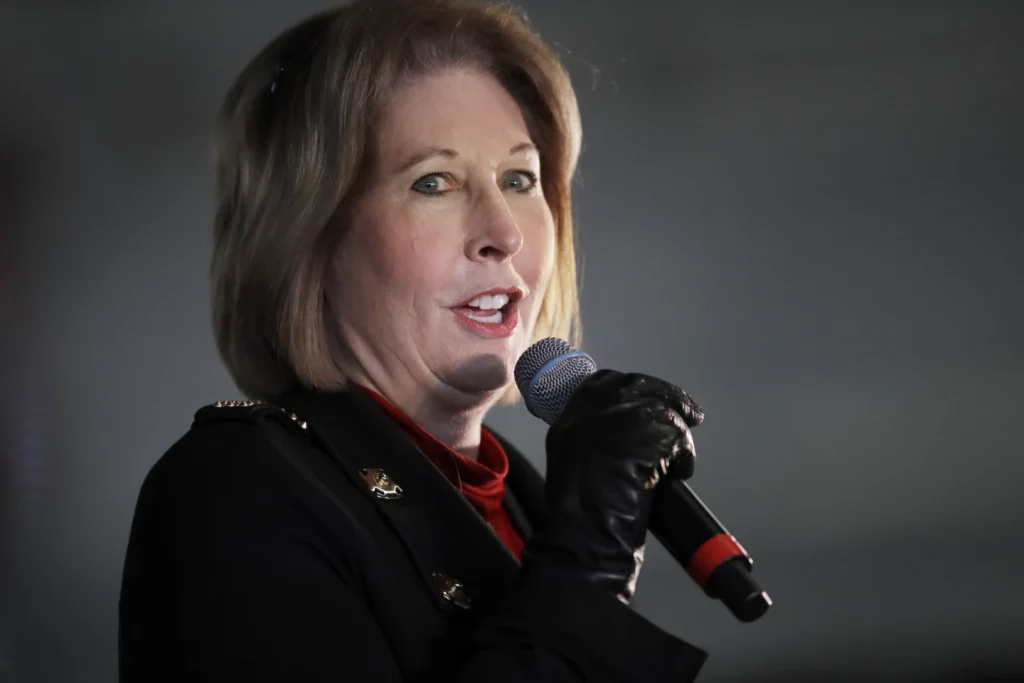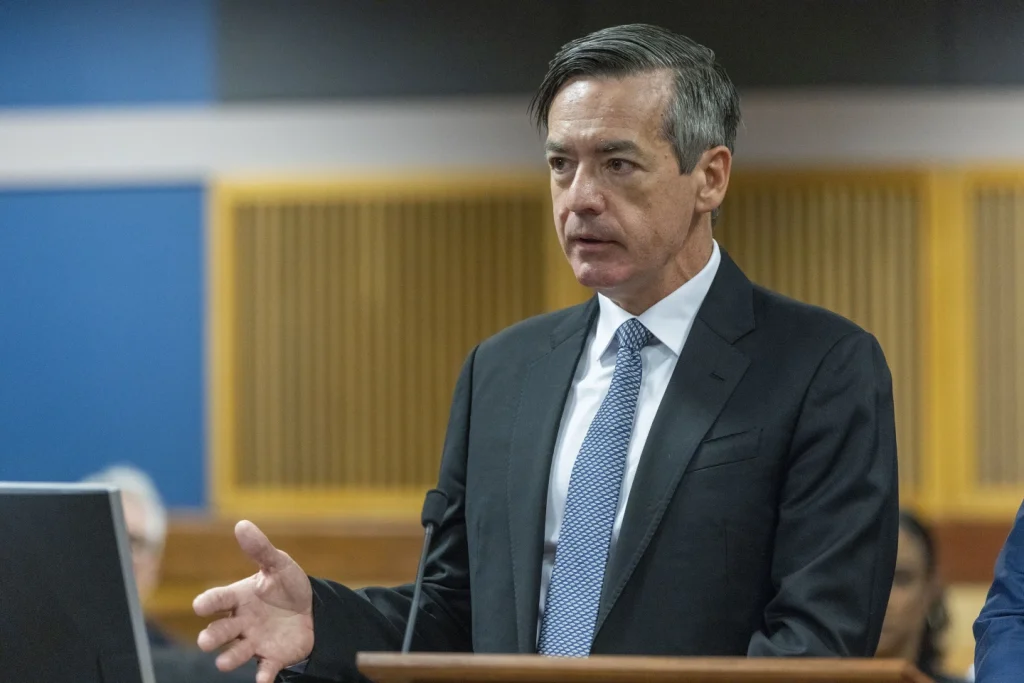The recent developments in the Georgia election interference case involving Donald Trump-allied lawyers Sidney Powell and Kenneth Chesebro have sparked controversy and raised questions about the sincerity of their apologies.
The apology letters, which were required as a condition of their plea deals, have come under scrutiny for their brevity and lack of acknowledgment of the legitimacy of Joe Biden’s win in Georgia’s 2020 election.
The one-sentence apology letters, obtained through an open records request by The Atlanta Journal-Constitution, have raised concerns about the genuine remorse of Powell and Chesebro.
Powell’s letter, dated October 19, simply states, “I apologize for my actions in connection with the events in Coffee County,” while Chesebro’s letter, dated October 20, reads,
“I apologize to the citizens of the state of Georgia and of Fulton County for my involvement in Count 15 of the indictment.”
What is notably absent from these letters is any acknowledgment of the baseless conspiracy theories that Powell and Chesebro promoted, which aimed to undermine the legitimacy of the election results and falsely claim that Trump was cheated out of victory through fraud.
The lack of remorse and failure to denounce these conspiracy theories has led to skepticism regarding the sincerity of their apologies.
The significance of these apology letters goes beyond the legal implications of the plea deals. It raises questions about accountability, integrity, and the impact of disinformation on the democratic process.
As legal professionals and public figures, Powell and Chesebro have a responsibility to uphold the principles of justice and truth.
Their failure to fully acknowledge their role in perpetuating baseless claims of election fraud undermines the public’s trust in the legal system and democratic institutions.
Furthermore, the brevity of the apology letters raises concerns about the sincerity of their remorse. A genuine apology requires a sincere acknowledgment of wrongdoing, an acceptance of responsibility, and a commitment to making amends.
The lack of depth and substance in these letters calls into question the authenticity of their apologies.
In addition to the content of the apology letters, the timing of their release has also raised eyebrows. The fact that the letters were only made public through an open records request adds to the perception that Powell and Chesebro may not have been fully transparent in their apologies.
This lack of transparency further undermines the credibility of their apologies and raises doubts about their commitment to accountability.
In conclusion, the apology letters written by Sidney Powell and Kenneth Chesebro in the Georgia election interference case have sparked controversy and skepticism.
The brevity of the letters, coupled with the lack of acknowledgment of the baseless conspiracy theories they promoted, raises questions about the sincerity and authenticity of their apologies.
As the legal process unfolds and the implications of their actions are further scrutinized, it is essential for Powell and Chesebro to demonstrate genuine remorse, accountability, and a commitment to upholding the integrity of the democratic process.
The recent developments in the Fulton County election interference case have sparked widespread discussion and debate regarding the implications for the defendants involved, the legal system, and the broader political landscape.
The case, brought forth by Fulton County District Attorney Fani Willis, has raised pertinent questions about the integrity of the electoral process, the accountability of public figures, and the effectiveness of legal mechanisms in addressing alleged misconduct.
The intricacies of the case, including the guilty pleas, the remaining defendants, and the implications of the first offender law, invite a comprehensive analysis and reflection on the multifaceted nature of justice and its application in contemporary society.
The decision of a spokesperson for Fulton County District Attorney Fani Willis to decline comment on the contents of the letters pertaining to the case signifies the sensitivity and complexity of the legal proceedings.
This deliberate silence underscores the gravity of the matter and the necessity for meticulous legal processes to unfold without undue influence or premature judgment.
It also reflects the adherence to legal protocols and the recognition of the significance of maintaining the integrity of the legal system.
The guilty pleas of Powell and Chesebro, among the four defendants, mark a pivotal juncture in the case, signifying a willingness to cooperate with prosecutors and acknowledge culpability in the alleged election interference.
These pleas raise questions about the extent of their involvement, the nature of the wider scheme, and the potential implications for other defendants, including former President Donald Trump, Rudy Giuliani, and Mark Meadows.
The decision to plead guilty and the subsequent sentencing, which included probation but no jail time, prompts contemplation on the balance between accountability and leniency within the legal framework.
Furthermore, the allowance to plead guilty under Georgia’s first offender law introduces considerations about the potential for rehabilitation, the concept of second chances, and the long-term implications for the defendants’ records.
The fact that the remaining 15 defendants, including prominent political figures, have pleaded not guilty underscores the complexity and contentious nature of the case.
This divergence in legal stances raises questions about the strategies, evidence, and potential outcomes of the trial.
It also underscores the significance of due process, the right to defend oneself, and the need for a thorough examination of the evidence before reaching conclusions.
The contrasting positions of the defendants contribute to the evolving narrative of the case and emphasize the need for a comprehensive and impartial legal process.
The implications of the first offender law, which offers the possibility of expunging the defendants’ records upon successful completion of probation, prompt reflection on the balance between accountability and rehabilitation within the criminal justice system.
This aspect of the case raises questions about the potential for individuals to redeem themselves, the effectiveness of rehabilitation programs, and the broader societal implications of second chances for those convicted of crimes.
It also highlights the complexities of balancing punitive measures with opportunities for reintegration and rehabilitation within the legal framework.
The Fulton County election interference case serves as a compelling lens through which to examine the intricate interplay of legal, political, and ethical considerations in contemporary society.
The case invites contemplation on the accountability of public figures, the complexities of legal proceedings, and the broader implications for the electoral process and democratic institutions.
It underscores the necessity for a fair, transparent, and thorough legal process while also raising questions about the potential for rehabilitation and second chances within the criminal justice system.
In conclusion, the developments in the Fulton County election interference case prompt a nuanced reflection on the multifaceted nature of justice, accountability, and the legal system.
The case serves as a poignant reminder of the complexities inherent in addressing alleged misconduct, navigating legal proceedings, and upholding the integrity of democratic processes.
As the case continues to unfold, it will undoubtedly spark further discourse and contemplation on the intricate dynamics of justice, law, and the broader implications for society as a whole.
In the ongoing legal proceedings, the letters submitted by the remaining two defendants, Jenna Ellis and Scott Hall, to express their intent to plead guilty have garnered attention for their length and specificity.
During a court session on October 24, Jenna Ellis, a legal representative for former President Donald Trump, emotionally addressed the judge, expressing profound regret for her role in contesting the election results.
She acknowledged her failure to thoroughly verify the accuracy of the claims made by her fellow attorneys amidst the frantic efforts to challenge the election outcomes across multiple states.
Similarly, Scott Hall, a bail bondsman who entered a guilty plea on September 29, penned a five-paragraph letter directed at the citizens of Georgia, in which he extended a heartfelt apology for his involvement in post-election activities.
Hall admitted to regretting his participation in these events, attributing his initial engagement to his observations of purported irregularities.
These developments have unfolded in the context of the initial charges brought against Sidney Powell, which include felony racketeering and six additional felony counts.
It is concerning to hear that Sidney Powell and Kenneth Chesebro have only written one sentence in their apology letters regarding the Georgia election case.
This case has brought to light some serious allegations against them and their involvement in unlawfully accessing election equipment without authorization, copying software and data from voting machines and computers, and conspiring with the Trump campaign to submit false slates of electors.
The indictment against Chesebro, in particular, is quite alarming as it alleges that he conspired with Trump and lawyers associated with his campaign to submit false elector certificates and communicated with Republican leaders in other swing states to do the same.
These actions go against the fundamental principles of democracy and the integrity of the electoral process.

Furthermore, the guilty plea of Ellis, who helped author plans on how to disrupt and delay the certification of the 2020 election’s results on Jan. 6, 2021, and urged state legislators to back false, pro-Trump electors in multiple states, is a clear indication of the extent to which some individuals will go to undermine the democratic process.
It is important that those who have been implicated in these actions are held accountable for their actions and that the integrity of the electoral process is upheld.
It is only through fair and transparent elections that the voice of the people can be heard and democracy can thrive.
